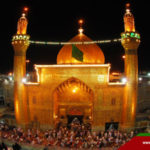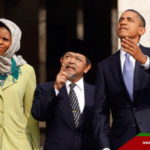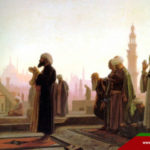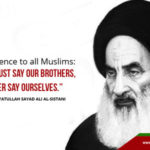A Muslim’s perspective on the right to freedom of expression
by Aun Hasan Ali
Last year Nakoula Basseley Nakoula, a convicted criminal, produced a film denigrating the beloved Prophet Muhammad (s). Clips of this movie were broadcast on the internet and on television, sparking protests in several Muslim-majority countries. Like the backlash against The Satanic Verses and the Jyllands-Posten cartoons, Muslims’ reactions to this film were widely seen as a symptom of Islam’s disregard for the right to freedom of expression. It is this perception of Islam that I wish to address in this short essay.
The right to freedom of expression
The right to freedom of expression is not absolute. Libel, slander, obscenity, sedition, copyright and national security are all examples of restrictions on the right to freedom of expression that are considered acceptable. The International Covenant on Civil and Political Rights, which was adopted by the United Nationals General Assembly in 1966, states that the right to freedom of expression, “carries with it special duties and responsibilities. It may therefore be subject to certain restrictions, but these shall only be such as are provided by law and are necessary: (a) for respect of the rights and reputations of other; (b) for the protection of national security or of public order, or of public health or morals” (www2.ohchr.org/english/law/ccpr.htm#art19) [accessed November 26, 2012]). Extraordinary circumstances may also justify specific limitations. For example, it is illegal to deny the Holocaust in several countries in Europe. So the real question is what is the scope of the right to freedom of expression?
Prejudices are only inflammatory in the context of relationships of power. Blacks hurling insults at whites is not equivalent to whites hurling insults at blacks. This cultural logic is evident in the routines of standup comedians: black comedians like Steve Harvey can safely ridicule the habits of white people, but white comedians must be careful because of a history of inequality. The history of colonialism and neo-imperialism is the context in which a minuscule percentage of Muslims reacted violently to this film. We ought to bear imbalances in power in mind when deliberating over the scope of the right to freedom of expression.
Finally, it is important to point out that the size of the protests was exaggerated in the media. Megan Reif, Assistant Professor of Political Science at the University of Colorado Denver, has analyzed the size of these protests in a study titled “Pro-democracy ‘Arab Spring’ crowds were much larger than those involved in the current protests in the Middle East and North Africa; lack of media objectivity about geographic scope of so-called ‘Muslim Rage’ has dangerous implications” (sitemaker.umich.edu/megan.reif/arab_uprisings_vs._anti-film_riots&config=ccQVbeV4dWtbXYtIOV7bJ0)
[accessed November 26, 2012]). The size of the protests were not larger than .003053% of the population of Muslims in any of the twenty-three countries for which Reif compiled data.What should one say?
In a famous treatise known as Risālat al-ḥuqūq, our beloved Imam Zayn al-ʿĀbidīn (as) tells us how we should use our ability to speak. He says, “The right of the tongue is that you consider it too noble for obscenity, accustom it to good, refrain from meddling in which there is nothing to be gained, express kindness to the people, and speak well concerning them” (www.al-islam.org/sahifa/treatise.html) [accessed November 26, 2012]). It may be that Imam Zayn al-ʿĀbidīn (as) had the words of his grandfather ʿAlī b. Abī Ṭālib in mind, for ʿAlī (as) is reported to have said, “The tribulations of man come from the tongue,” and “The tongue is a wild beast; if left alone it would devour well-being.” And when speaking of well-being, ʿAlī (as) is reported to have said, “There are ten parts of well-being; nine of them pertain to silence excepting the remembrance of God, and one of them pertains to quitting the company of fools.”
So we are told to use our tongues sparingly and carefully, for, as ʿAlī (as) is reported to have said, “The size of the tongue is small, but its sin is great.” Furthermore, our beloved Prophet (s) is reported to have said that most people enter hell on account of their mouths and their sexual organs. And when he was asked if we will be held accountable for what we say, our beloved Prophet (s) is reported to have said, “Are people thrown into hell for anything other than what they reap with their tongues?” It is said that once the Prophet (s) was asked about the way to heaven whereupon he replied, “Feed the hungry, quench people’s thirst, advise them to do good and admonish them not to do evil. And if you cannot do that, then guard your tongue against everything that is not good.”
Using one’s tongue wisely is a sign of faith. Our beloved Prophet (s) is reported to have said, “The tongue of a believer is behind his heart. When he wishes to speak he contemplates with his heart, then endorses with his tongue.” God has informed us how to speak to others. In al-Naḥl 125 he says, “Invite people to the way of your lord with wisdom and good counsel, and dispute with them using that which is better.” Furthermore, we are told not to abuse other people’s deities. In al-Anʿām 108 God says, “Do not abuse those upon whom they call apart from God lest they vindictively abuse God out of ignorance.” It is said that during the battle of Ṣiffīn some soldiers in ʿAlī’s camp started abusing soldiers in Muʿāwīyah’s camp. ʿAlī (s) is reported to have said, “I would hate for you to be among those who abuse others.” And when ignorant people address you, follow the example of those whom God calls “slaves of the most-merciful” (al-Furqān 63) and simply say “peace.”
Finally, there are certain instances when it is sinful not to speak out. For example, it is sinful to keep quiet in the face of oppression. Our beloved Imām al-Ṣādiq (as) is reported to have said, “The oppressor, the one who aids him and the one who is pleased with it, all three are partners.” There is perhaps no better example of this principle than the martyrdom of our glorious Imam al-Ḥusayn (as).
Limitations on the right to freedom of expression
Islamic law does prescribe punishments for some kinds of speech. For example, abusing the Prophet (s) is normally considered a capital offense. There are, however, a few mitigating factors. First of all, the conventional view is based on the evidentiary-value of non-renowned reports, which ultimately rests on what is known as “the common practice of rational people” in Shīʿī law. Someone wishing to contest the conventional view might argue that non-renowned reports do not have evidentiary-value in “important matters” because “rational people” demand certitude in those cases, and non-renowned reports do not give rise to certitude. This possibility is mentioned in al-Sayyid Aḥmad al-Khwānsārī’s Jāmiʿ al-madārik. Human life is an “important matter,” a point made in Sharāʾiʿ al-islām by al-Muḥaqqiq al-Ḥillī. Therefore, capital punishments cannot be based on non-renowned reports; capital punishments require an explicit Quranic text, a renowned report, a corroborated non-renowned report or a definitive rational argument.
Furthermore, there is a long-standing question in Shīʿī law about whether or not the ḥudūd can be implemented during the ghaybah. Among those who say that they cannot are al-Muḥaqqiq al-Ḥillī, Ṣāḥib al-Jawāhir, al-ʿAllāmah al-Ḥillī, Ibn Zuhrah, Ibn Idris and al-Sayyid Aḥmad al-Khwānsārī. Some of them may have expressed different views in different books, and some of their expressions are not crystal clear. This list could be expanded if we included those jurists who believed that taʿzīr, or discretionary punishment, should be implemented in place of ḥudūd during the ghaybah. Al-Shahīd al-Thānī held this view in Masālik al-afhām, and so did al-Mīrzā al-Qummī.
Even if one takes the conventional view, it is important to bear in mind that the standard of evidence in capital cases is higher than what can normally be met. The operative principle is “darʾ al-ḥudūd bi-l-shubuhāt,” which means that, in the face of doubts, the ḥudūd should not be implemented.
Aun Hasan Ali
Institute of Islamic Studies
McGill University








